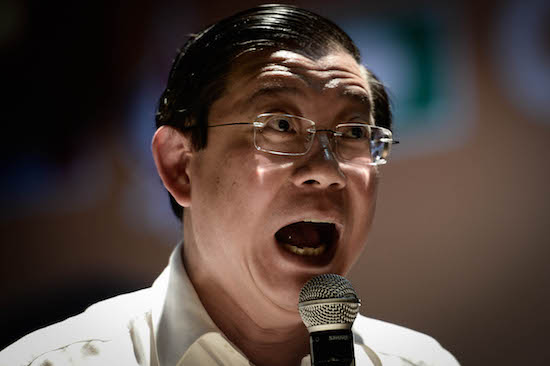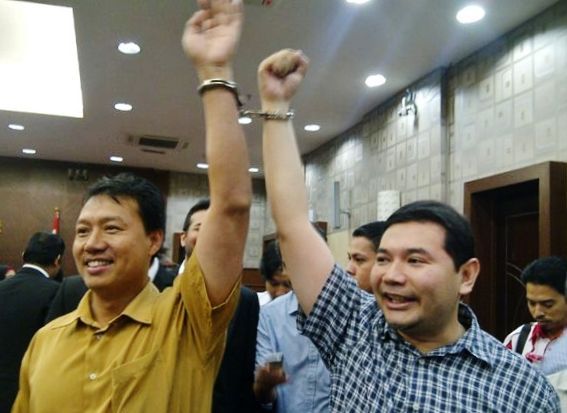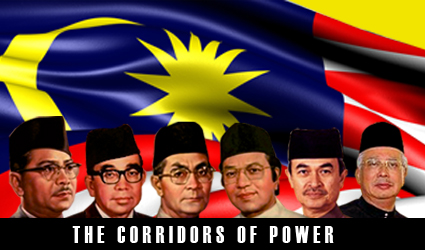Guan Eng cakap karut
In this case Rafizi is claiming he is the victim and not the criminal. And Guan Eng agrees with Rafizi but admits that it is the laws that are wrong. Is Guan Eng now going to propose that laws should be passed making it mandatory for banks to post the bank statements of all its customers on a public noticeboard outside the bank so that there are no banking secrets?
THE CORRIDORS OF POWER
Raja Petra Kamarudin
This was what Penang Chief Minister Lim Guan Eng said today:
“I am not criticising the judiciary, they are just doing their job. I am criticising the BN federal government for prosecuting (Rafizi) despite saying they would not take action against whistleblowers. But yet, they rely on laws that could enable them to prosecute whistleblowers instead.”
“They have inserted whistleblower protection clauses in anti-corruption laws, but older laws are not amended to protect whistleblowers. Go after wrong reports and people who lie, but not the whistleblowers. We strongly support Rafizi in this case and are ready to render all help needed.” (READ MORE HERE).

Guan Eng says Rafizi should be protected instead of jailed even though Rafizi broke the law
Yes, that was what Guan Eng said, mainly cakap karut. Now read what the Malaysian Anti-Corruption Commission (MACC) said regarding the same matter. If Guan Eng does not speak English well, then he should have asked someone to translate what the MACC said (below) into Chinese before opening his mouth.
The issue of the rights and protection for whistleblowers is very clear. You can read what the MACC said about the matter below. There is no confusion or ambiguity here. It is the issue of the interpretation of what a whistleblower is that Guan Eng should be talking about instead.
There are certain criteria to meet to qualify as a whistleblower. If you do not meet these criteria then you are NOT a whistleblower. It is as simple as that. In short, there are rules and regulations. And you must follow these rules and regulations. And Rafizi Ramli did not. Hence, he is not a whistleblower.
You cannot proclaim yourself a whistleblower and then do what you like. It is just like terrorists proclaiming themselves patriots who are allegedly defending their motherland and then go and murder school children ‘for the good of the cause’. If they do that they will be regarded as terrorists and not patriots.

Rafizi says he may have broken the law but he did it for a good cause just like terrorists blow up school buses for a good cause
So, no, Rafizi is NOT a whistleblower because he did not meet the criteria of a whistleblower. There are rules and regulations that whistleblowers must follow and Rafizi did not follow them. So, by his own acts, he disqualified himself as a whistleblower.
Banks have secrets and if these secrets are not protected no one will have confidence in banks. Foreigners will never deal with Malaysian banks and Malaysia’s banking industry will collapse.
When someone steals from you, the proper course of action is you lodge a police report and action will be taken against the thief. If you and a gang of 10 people beat up that person and he dies, you cannot scream that you are the victim of theft and not the deceased who is the victim of murder.
In this case Rafizi is claiming he is the victim and not the criminal. And Guan Eng agrees with Rafizi but admits that it is the laws that are wrong. Is Guan Eng now going to propose that laws should be passed making it mandatory for banks to post the bank statements of all its customers on a public noticeboard outside the bank so that there are no banking secrets?
ARVE Error: src mismatch
provider: youtube
url: https://www.youtube.com/watch?v=yE5LWvtgHy4
src in org: https://www.youtube.com/embed/yE5LWvtgHy4?wmode=transparent&rel=0&feature=oembed
src in mod: https://www.youtube.com/embed/yE5LWvtgHy4?wmode=transparent&rel=0
src gen org: https://www.youtube.com/embed/yE5LWvtgHy4
**************************************************
The Malaysian Anti-Corruption Commission
A whistleblower is a person who provides information disclosing an act of improper conduct, to the relevant enforcement agency (i.e MACC), that may enable the enforcement agency to initiate an investigation. The whistleblower’s identity shall not be disclosed and protections will be provided under the Whistleblower Protection Act 2010.
The Whistleblower Protection Act 2010 provides protection to whistleblowers who voluntarily come forward to report or reveal information on corruption activities. This Act also encourages the public from all sectors to disclose corruption related activities. The identity of the whistleblower and the information provided are kept confidential from any party. Whistleblowers are also given immunity from any civil, criminal or disciplinary action due to the revealing of the act of corruption.
The Whistleblower Protection Act 2010 is a law of Malaysia to combat corruption and other wrong doings by encouraging and facilitating disclosures of improper conduct in the public and private sector, to protect persons making those disclosures from detrimental action, to provide for the matter disclosed to be investigated and dealt with and to provide for the remedies connected therewith.
The act was passed by Parliament in June 2010, and was brought into force on 15 December 2010. The objective of this act is to give protection to the whistleblower in the form of confidentiality of their information, immunity from civil and criminal action and protection from detrimental action being taken against them. Whistleblower protection is one of the Malaysian Government’s efforts towards tackling corruption and promoting good governance under Government Transformation Programme (GTP).
The whistleblower protection law covers any member of the public and private sectors who discloses wrongdoings. Among the disclosures that intended to be disclose are abuse of authority, violation of laws and ethical standards, danger to public health or safety, gross waste, illegality and mismanagement. The disclosure should be made in “good faith” based on “honest and reasonable grounds at the material time” without necessitating hard evidence from the whistleblower. The duty of gathering evidence will be tasked to the investigation unit of the enforcement agencies to ensure that the whistleblower is not compromised. However, whistleblowers can provide evidence if it is legally available through the course of their work.
Disclosure of the confidential information will be liable to a fine not exceeding RM 50,000 or to imprisonment for a term not exceeding ten years or both. A whistleblower will not be subject to any civil action or criminal liability and no administrative process can be taken against the whistleblower for making disclosure of improper conduct. Under the act also, no person shall take detrimental action against any whistleblower or person related to or associated with the whistleblower in reprisal for a disclosure of improper conduct.


